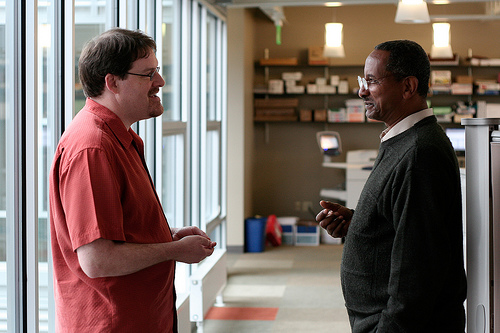blog
Diversity of age and intellect
‘I think I might be ageist’ she told me in her first coaching session. She was a 26 year-old high flyer in the technology sector, trying to work out what kind of leader she wanted to be, in a world where she saw little leadership that she found inspiring, free of ego and built on integrity.
The comment was directed at me as her coach, and I was intrigued about how that might play out during the course of her coaching programme. She was also struggling to find a connection with people from whom she felt intellectually distant because she found it hard to communicate with them: the challenge of intellectual diversity.
The multi-generational workforce: effective working relationships
In most organisations baby-boomers (and older) work alongside Generations X and Y. And as the working population ages there’s going to be a growing distance between the oldest and the youngest in any given workforce. In my experience employees are most effective in their working relationships when they’re aware of and engage with others’ assumptions and world views, and far less effective when they fail to recognise or adapt to others’ differences.
Diversity of pace
One of those differences relates to pace: the pace of thinking, of decision-making, of action. Our world seems to be getting faster and faster, with a parallel expectation that our workforces should act faster and faster. This militates against the reflection time that my coaching clients tell me gives them space to stand back from the rush of their daily lives, gain perspective and insight, and gain the space to focus on what’s really important rather than what needs doing next. It also helps them to avoid hurling themselves without thought into the next action.
Slowing down
Learning & Development colleagues employed in organisations tell me that their young staff – Generations X and Y – like the concept of coaching but resist the idea of slowing down long enough to reflect. The relentless speed at which they function means they have little down-time to understand what the issues really are behind the challenges they face. It’s the baby-boomers who more often occupy the territory of ‘slow’ and more reflective, and who can find themselves the target of disparaging remarks by their younger colleagues as a result.
Speed-leadership
We’re in danger of getting to a point where speed-leadership rules: leaders who are driven by the need to get results quickly and who ignore the cost to relationships with customers and staff, to engagement, to high-quality strategic thinking and ultimately to profitability.
Slowing down can enable clients of all ages to get to the heart of challenges
Interestingly, once coaching clients (including, in my experience, talent aged 26 upwards) start to be coached, they value enormously the space they gain to step back and get to the heart of their issues – and discover what their challenges are really about. So how can organisations which employ Generations X and Y (which all organisations do) sell the value of slowing down to get to the heart of their challenges, and engage their people in the strategic issues inherent in those challenges – and thus involve them in creating the solutions rather than simply demanding task-fulfilment? How can they sell the benefits of interventions such as executive coaching which imply slowing down? How can they create the glue that knits together the varying contributions of the various generations and the pace at which they work?
Leaders play a crucial role in raising awareness of ‘slow’
Leaders play a key role in raising awareness of the value of ‘slow’ and where it fits in creating a culture which values all contributions and recognises diversity of expectations. And coaches may need to re-examine their approaches so that for their younger clients they speed up the beginning of coaching programmes and slow down later.
What really matters is whether the coach can enter the client’s world
My own experience of coaching young talent – including that 26-year-old – has brought me the feedback that what really matters, and what produces significant coaching results, is whether the coach can enter the client’s world rather than how fast they function: whether they can adapt to the apparent need for speed and introduce the space and time to enable the client to create new, meaningful options and the depth of awareness that anchors sustainable change.
Photo by hjhipster via Compfight
The multi-generational workforce - and diversity of pace
In most organisations baby-boomers (and older) work alongside Generations X and Y. Their attitudes to pace can divide them: Xers and Yers often resist the idea of slowing down long enough to reflect while the baby boomers are more inclined to reflect. The generations are most effective when they’re aware of and respect others’ assumptions and world views - and coaches are most effective when they can enter the client’s world.
Read more »Teams, listening and connection
Leaders are sometimes solitary and lonely figures, disconnected from their team . Leaders who who listen to their teams see in return greater engagement, better retention rates and bigger, more long-lasting results.
Read more »Extremes of uncertainty in coaching
Lindsay's article on extremes of uncertainty in coaching has been published in Coaching at Work magazine, November-December 2013 issue. The article explores what works when clients find themselves adrift, or when the foundations of their careers or their lives have seemed to disintegrate.
Read more »Optimism: a route to high performance
Humans tend to overestimate the likelihood of positive events, and underestimate the likelihood of negative events. Optimists work harder and longer hours than pessimists, which may account for their higher pay - and optimism has been linked to achievement in education, business, sport and electoral politics. This doesn't seem to fit with our society's tendency to drive for perfectionism, condemn mistakes, and focus on what's gone wrong.
Read more »Resilience, the bottom line and Ordinary Magic
Research has shown that engaged organisations experienced 11.74% quarterly revenue growth compared to a 6.30% decline in revenue at organisations with less engagement - and resilience helps build engagement. resilience is often the backdrop to my executive coaching, Success isn’t about travelling a smoother road but rather about climbing out of the pothole and bouncing back – and the key to being able to do that isn’t just to keep going, but to keep learning. Also relevant is the work of Ann Masten, on Ordinary Magic: children’s resilience is linked to: connection with competent and caring adults, cognitive and self-regulation skills, positive views of the self, and motivation to be effective - just like leaders in many ways.
Read more »Article on coaching that's free of the coach's ego
When I’ve been truly present, when I’m delivering a deep level of listening, when I’m in a relationship of ‘connected separateness’ with my executive coaching clients - without an attachment to the coaching objectives, albeit holding those objectives in focus - the quality of their development and transformation has sometimes been startling.
Read more »Self-awareness: the heart of executive coaching
My belief is that leadership is about creating momentum for a better world by inspiring and engaging other people: in other words, enabling human flourishing. If leaders are to get things done through other people they need to create and nurture trusting, vibrant relationships, to inspire with a vision, to persuade and energise, and to engage with other people’s perspectives. This ability to connect with others is crucially dependent on the ability to connect with self: to become aware of one’s own behaviours and thinking, drivers and blockers. Equipping a client to become deeply self-aware is at the heart of executive coaching.
Read more »Chaos and organisational life
In the chaos and confusion that sometimes is the hallmark of life at work, while their organisations are demanding big results, what leaders really need is the simplicity and peace to know who they are and that they have the resources to sustain and nourish themselves.
Read more »Creativity, innovation and leadership
David Bowie, pop artist and visual artist, was a creative and innovative pioneer. The leaders we need in our turbulent and fast-changing climate likewise value experimentation, creativity and innovation, they read the market and the system, and they have the courage to pioneer.
Read more »Career refocus: stepping off the treadmill
Several of my executive coaching clients feel like they're on a treadmill, stressed and under pressure. And yet it's exceptional for any of them to choose to get off the treadmill. Instead, they make career decisions based on a fuller sense of awareness, within a context of well thought-through perspectives, rather than being based on emotion, stress, exhaustion or just not seeing broader horizons
Read more »











